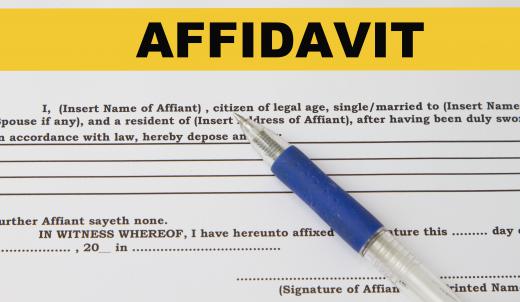
A domestic partner affidavit is a legal document signed by two people, usually in jurisdictions that don’t permit gay marriage or civil unions, declaring that they’re in a marriage-like relationship. Commonly required by employers and their insurance carriers to prevent fraud in enrolling participants in various benefit programs, they’re somewhat controversial among both critics and advocates of gay rights. Domestic partner affidavits generally pertain only to a specific benefit or set of benefits offered by a single entity, such as an employer or housing administrator.
When the trend of providing family benefits like health insurance to gay employees in marriage-like relationships began in the late 20th century, no means of validating those relationships existed. Married couples could present a marriage certificate, but if the state didn’t permit gay marriage or civil unions, gay couples had no official documentation of their status. Especially concerned about the potential for fraud, employers and their insurance carriers created domestic partner affidavits listing the attributes of such partnerships, and required affected participants and their partners to sign.

The variety of domestic partner affidavits created by employers and insurance carriers contains many differing standards. Most require that the partners make assertions about their relationship, such as its length and verification that they share a residence. Many also require couples to declare that they’re financially interdependent, and some require documentation in the form of joint bank or credit card statements. A few affidavits require the couple to affirm that an intimate relationship exists.

Validation of domestic partnerships to avoid fraud is a very serious issue for employers and insurance carriers. In American states where gay marriage or civil unions are permitted, couples can obtain government certification of the relationship the same as married couples and present that certification to their employers. Most American states have neither, though, leaving it to employers and their insurance carriers to determine how to qualify gay couples for family benefits. Acknowledging that requiring a domestic partner affidavit is more intrusive than requesting proof of marriage, they insist that without requiring some minimum standard that a serious relationship exists, the potential for fraud would be much greater.
Gay and lesbian advocacy groups recognize the problem faced by employers and insurance carriers, and try to monitor the affidavits they create. They recommend that a domestic partner affidavit be signed only when there’s no other way to enroll a partner in a benefit program, since the affidavits don’t automatically entitle their signers to any other privileges under the law. They further recommend that a domestic partner affidavit should contain only the names of the partners and the date the relationship was solemnized. Some legal advisers have suggested that the declarations of financial interdependence in most domestic partner affidavits may create obligations above and beyond those involved in traditional marriage, thus reinforcing the idea that they should be signed only as a necessary step in obtaining important benefits like health insurance.
MyLawQuestions is dedicated to providing accurate and trustworthy information. We carefully select reputable sources and employ a rigorous fact-checking process to maintain the highest standards. To learn more about our commitment to accuracy, read our editorial process.